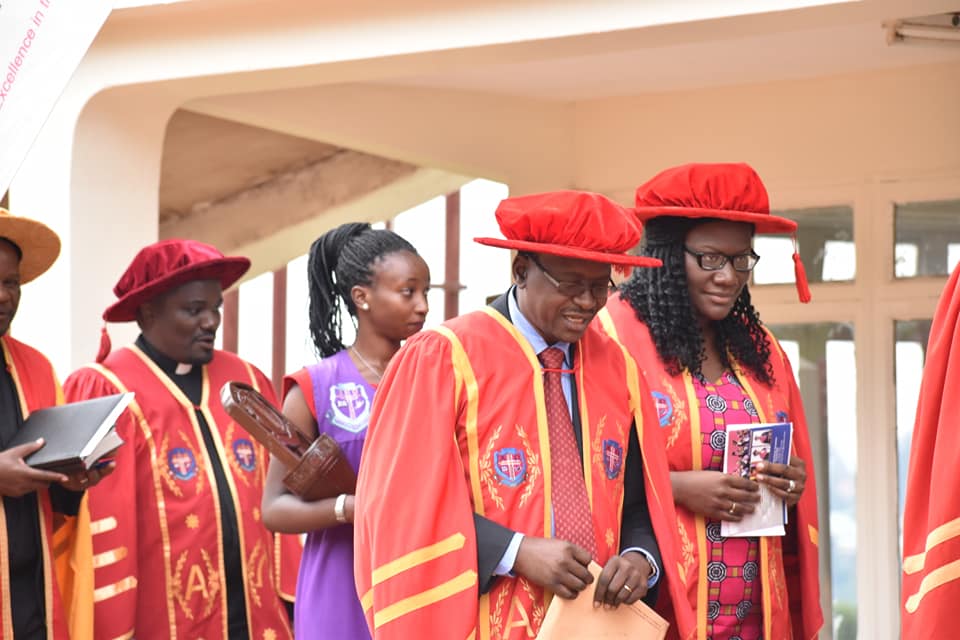By Asenath Were
Uganda Christian University (UCU) has empowered women in all aspects. As Uganda joins the entire world to celebrate International Women’s Day on March 8, UCU has elevated women to key decision-making positions.
Previously, in the United States, the inaugural National Woman’s Day was marked on February 28, 1909. This day was established by the Socialist Party of America to commemorate the 1908 garment workers’ strike in New York, during which women opposed working conditions.
Over time, social structures have changed, leading to changes in the roles women play in politics, childrearing, and the workforce. Women’s labor force participation rate grew from 34% in 1950 to 60% in 2000 and is expected to be 0.7% per year through 2050.
https://usafacts.org/articles/how-has-the-role-of-women-changed-over-the-last-50-years/
Florence Nakiyinji, the Director of Human Resources and Administration (HR), says that she feels empowered by UCU. She says she counts herself very lucky and very blessed because not many women rise to the CEO or director position as men.

“I feel supported; it has supported me to do several trainings to get to where I am, so I am very cognizant of that. From my work experience, I know that women make very good leaders if they have been prepared and mentored.” She said.
Nakiyinji says she found a very good team here and had a very good mentor, Mrs. Irene Masanga, the then director of HR, who had worked here for over 15 years and knew all the ins and outs. “She provided a very good mentor in terms of documentation and policies; she taught me the basics of filing and minute writing,” Nakiyinji elaborated.
According to Rosemary Bulyaba, the dean for agricultural sciences, UCU is a very good place to work as a woman when it comes to equity. She feels supported and has not been in any situation where she has been excluded because she is a woman.
“UCU provides an environment that is quite supportive for women; our potential is recognized here; we are never put aside; if there are opportunities or roles, the Vice Chancellor (VC) will send them out to everyone, and everyone will be included,” Bulyaba said.
She says the VC has always recommended them for the women’s academy, which she got to attend last year, and he provides support in cases where financial support is needed from the university to attend some of the workshops.
On the other hand, Pamela Tumwebaze, the Dean of Student Affairs at UCU, says that, as a woman, she should embrace her gender and thrive in it. For her, being a woman, one of the tasks she has is to inspire other women.
“In my mind, I am not looking at the females whom I work with in isolation from the men, but I like to see them also coming up without self-pity; I would like to see them emerge as people who have strength, skills, and opportunities, who have been to school, who are ready to take on the mantle God has given them instead of feeling sorry for themselves.” She emphasized.
“Stop being ladies, stop being women, wanting to rub it in everyone’s face that this is my gender, but instead, let them be people. I think God has blessed us so much that they should stop putting themselves in a bubble of the rest. Tumwebaze encourages the ladies of UCU.
Mary Kagoire, dean of the School of Education, says the institution gives them a lot of support, adding, “As far as UCU is concerned, it is more of one’s ability than the gender. I have not seen anyone being denied at UCU because she is a woman; it is just one’s ability to do work, one’s integrity, and one’s capability.” She said.
“I feel empowered and I feel I am in charge; sometimes I feel that I have lots of responsibilities, which I have to undertake, and I would not want to let down the institution, so sometimes you find yourself working so late so that things are done as they should be,” Kagoire commented.
She added that women feel guilty if they have not accomplished “I do not know about men, but as a woman, I feel that if something is not accomplished as it should be, I feel indebted and shy, so as a woman, I feel I have been empowered to do what I am expected to do.” Kagoire noted.


